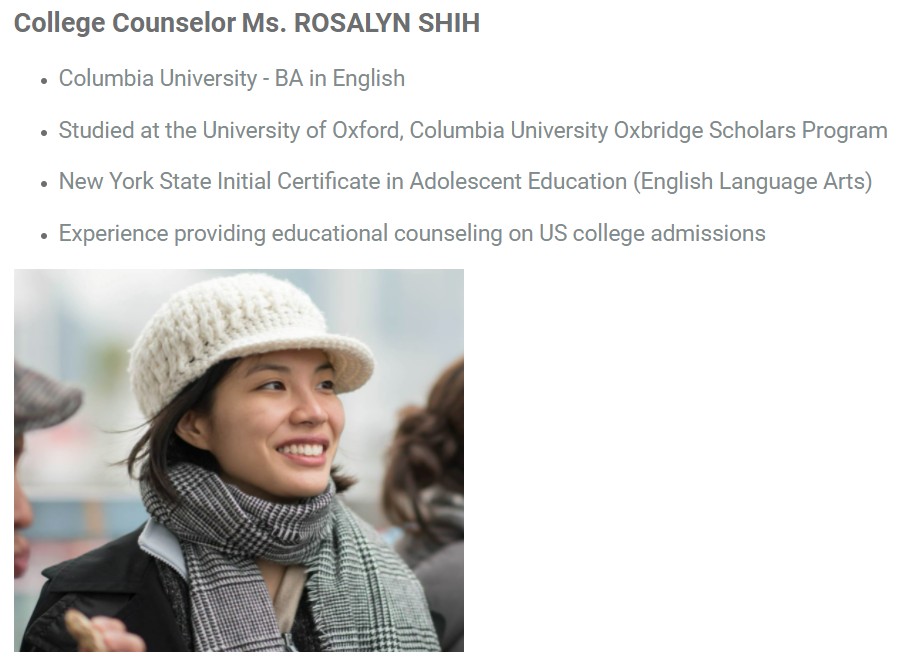
VIS is authorized by the College Board to provide AP (Advanced Placement) courses. The following article is from the official College Board website. The below will help us understand how to find a College that fits you.
Original source: https://reurl.cc/AKL8Lp
How to Find a College That Fits You
Some students want to find the perfect college. The truth is, there’s no such thing. You can find many colleges at which you’ll be happy and get a great education. The college search is about exploring who you are and what you want and then finding colleges that will meet your goals.
Still, you do need to narrow down the possibilities into a manageable list. Here are steps you can take to find colleges where you will thrive.
Decide What You Want in a College
Ask yourself what’s important to you, where you want to be and who you want to become. Then you can figure out what types of colleges will allow you to reach your goals.
Here are some aspects to consider:
- Size
- Location
- Distance from home
- Available majors and classes
- Housing options
- Makeup of the student body
- Available extracurricular activities
- Campus atmosphere
Which of these aspects are things you feel you must have to be comfortable at a college? Which things are you flexible on?
Also, think about what you want to accomplish in college. Do you want to train for a specific job or get a wide-ranging education? If you have a major in mind, are the colleges you’re considering strong in that area?
Keep an Open Mind
While it’s good to have some ideas in mind about what sorts of colleges will be right for you, stay open to all the possibilities at the beginning of your search.
Challenge your assumptions about what will work for you. For example, “you may not think you're able to thrive in a large institution because you come from a small high school, but ... you may actually do better in that type of setting,” notes Luis Martinez-Fernandez, a history professor at the University of Central Florida.
Talk to people who know you. Tell parents, teachers, relatives, family friends and your school counselor about your goals, and ask if they can suggest colleges that may be a good fit for you.
Don’t limit your search. At the start of this process, you may rule out colleges because you think that they are too expensive or too hard to get into, but this may not be the reality. Remember that financial aid can make college more affordable and colleges look at more than just grades and test scores.
Do Your Homework
Once you have a list of schools, it’s time to do research. To learn more about the colleges you're considering, check out college guidebooks and the colleges’ websites. Jot down your questions and get answers by:
- Talking to your school counselor or teachers
- Checking out colleges’ student blogs, if available
- Contacting college admission officials
- Asking admission officials to recommend current students or recent graduates to talk to
- Visiting college campuses, if possible (for more information, see the Campus Visit Checklist)
Keep Perspective
During your search, keep asking yourself questions about your preferences and goals. You are changing throughout high school, so your answers may change during the search process.
And remember that there are many good college matches for every student, and that you can be successful at many types of schools. At College Board, we introduce test scores as one additional factor to weigh as you balance your list. Think about narrowing your colleges into three categories:
- Safeties: Your SAT or ACT score is higher than the average score range of last year’s freshman class.
- Matches: Your SAT or ACT score is solidly in the same score range as last year’s freshman class.
- Reaches: Your SAT or ACT score is lower than the average score range of last year’s freshman class.
To have a balanced college list and increase your chances of acceptance, we recommend including 3 reach colleges, 2 match, and 1 safety college.
If you would like to discuss college options further, please make an appointment with our college counselor Rosalyn Shih (collegecounseling@vis.tp.edu.tw) to find out more.
VIS 為美國大學理事會(College Board)正式認證學校,經授權可開授AP課程。以下文章出自於美國大學理事會 College Board 官網,提供中文翻譯給學生家長參考,讓我們一同來看看如何找到適合自己的大學
原文出處:https://reurl.cc/AKL8Lp
如何找到適合自己的大學
有些學生總想找到完美的大學,不過這是不可能的事。但你可以找到很多能讓你快樂就讀、充實受教的大學。而搜尋大學的過程,其實是自我探索、並從中了解自己想要的,進而找到符合目標的大學。
儘管如此,你一定還是得把清單縮減到容易處理的程度,按照以下步驟找出能讓你成長的學校。
決定自己在大學的目標
不妨捫心自問,對你最重要的事情是什麼、你想立足何處、成為什麼樣的人。接著才能了解什麼類型的學校可以讓你達到目標。
請考量以下各層面的條件:
- 學校規模
- 學校地點
- 離家距離
- 學校提供的主修與課程
- 住宿選擇
- 學生成員組成
- 學校提供的課外活動
- 校園氣氛
哪方面是你在就學時不可或缺的條件?那些可以有彈性地接受妥協?
此外,請思考自己在大學想達成什麼。你想要的是特定工作的教育訓練,還是想要多元的學習?如果心中已有預定的主修科目,這些領域是你志願學校的強項嗎?
保持開放態度
雖說心目中有認定適合自己的大學是件好事,在開始搜尋學校的時候仍然應該保持開放的態度。
挑戰自己的假設。舉例來說,中央佛羅里達大學歷史系教授 Luis Martinez-Fernandez 表示:「你可能因為自己來自小型的高中,而認為自己無法在大型學校表現,不過…你其實可能在這樣的環境能表現得更傑出。」
與了解你的人對談。把自己的目標告訴家長、老師、親友、學校輔導老師,問問他們是否能建議適合你的大學。
搜尋不要侷限。一開始搜尋的時候,你可能就會排除你認為費用太昂貴或太難申請成功的大學,不過這可能不符現實。請記得,大學學費可以透過財務協助降低負擔,而成績與分數也只不過是校方考量的一環而已。
做足準備工作
準備好你的志願清單後,就可以開始著手研究。了解你正在考慮的學校,找出校園導覽手冊和網頁,列出你的疑問,並用以下方式找到答案:
- 跟學校輔導老師或教師談話
- 如果有學生論壇或部落格不妨參考
- 與大學入學辦事員聯絡
- 詢問辦事員是否能推薦在學學生或應屆畢業生供諮詢
- 可以的話,親自走訪大學校園 (更多詳情請見校園參訪清單 Campus Visit Checklist)
保持觀點
在搜尋過程中,不斷自問你的喜好和目標。你在高中就學過程中歷經許多改變,而同樣地你在搜尋學校的過程中,也可能改變心意。
請記住,每一位學生都會有許多適合的學校,而你也可以在很多不同類型的學校裡表現優異。College Board 導入考試成績供你當作參考變因,讓你可以在志願清單中權衡考量。接下來請思考如何把志願清單縮小到以下三種類型:
- 安全型:你的 SAT 或 ACT 分數比去年入學大一生的平均分數高。
- 達標型:你的 SAT 或 ACT 分數確實落在去年入學大一生的平均分數之一定範圍內。
- 高標型:你的 SAT 或 ACT 分數比去年入學大一生的平均分數低。
要把清單做全盤權衡考量、讓申請成功的機會增加,我們推薦你可以在清單裡包含 3 個高標型、 2 個達標型以及一個安全型。
如果VIS同學們想進一步討論如何選擇海外的大學,請與VIS的升學顧問 Miss Rosalyn Shih (collegecounseling@vis.tp.edu.tw) 預約晤談以了解更多資訊。
 VIS 國際實驗教育 高中部/國中部/小學部 G05~G12
VIS 國際實驗教育 高中部/國中部/小學部 G05~G12
